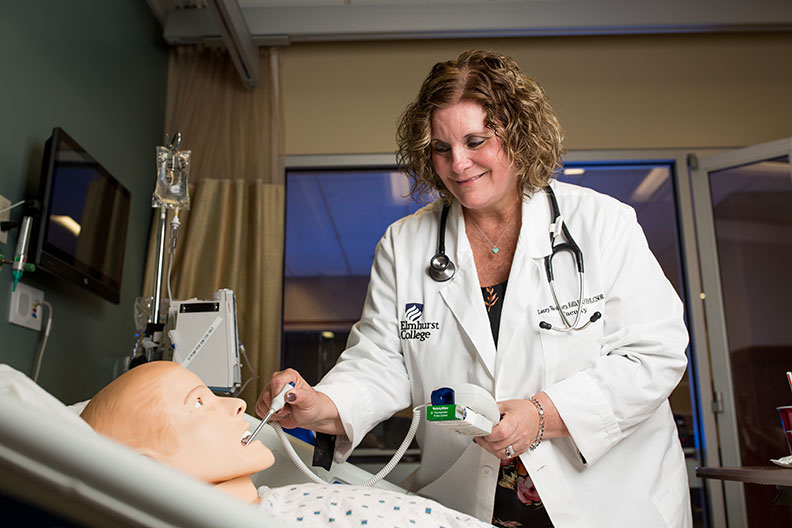A Surgical Assist
Hospitals in need of O.R. nurses turn to Laury Westbury and the hands-on class she created.

Soon after Laury Westbury ’07 began teaching in the Elmhurst University nursing department about six years ago, she was asked to develop an elective course introducing students to perioperative nursing, the specialty built around providing care to surgical patients.
Hospitals were reporting that as perioperative nurses retire and leave the workforce, they aren’t being replaced quickly enough. Westbury knew part of the reason why was simply that most nursing students don’t get much exposure to the field beyond a few hours observing a surgery—and no real experience in the role.
So she created an innovative, hands-on course that drew from her own 30-year career as an operating room nurse and hospital educator. The results are impressive: More than one-third of the students who’ve taken the course decide to pursue careers in perioperative nursing, and hospitals have shown their appreciation by offering jobs to 98 percent of those students once they graduate.
“Facilities are calling me, saying, ‘I only want Elmhurst students who’ve taken this course’ because it helps them out immensely in getting students acclimated to the specialty,” she says.
Perioperative registered nurses provide surgical patient care either as scrub nurses, who select and pass instruments to surgeons during operations; or as circulating nurses, who manage patient care during and after surgery. Westbury’s course gives students experience in both kinds of patient care.
Students take the course as seniors. They begin in the fall in the University’s Simulation Center at Elmhurst Memorial Hospital, where Westbury serves as director. During January Term, they perform 90 hours of clinical work at one of several partner hospitals throughout the Chicago area, including Edward-Elmhurst, Loyola University, Lurie Children’s, University of Illinois at Chicago and Good Samaritan. Throughout their clinical work, Elmhurst students learn directly from nurses, surgeons and other team members.
The class prepares students so well that the ones who decide to go into that specialty can hit the ground running, starting their jobs with significantly more experience in O.R. procedures and best practices than other new perioperative nurses, Westbury says.
“Students learn so much about this area and gain enough experience to really see whether it is an aspect of nursing that might interest them,” she says. “And even if they don’t end up working in an O.R., students always say the course was valuable, just for the opportunity to see what patients go through in the O.R., and to know how to care for them afterward.”
Because Westbury still works as an O.R. nurse—she works weekends as part of an open-heart surgery team—medical colleagues often let her know about job openings, and she has helped to connect students to them. At the same time, she has stayed in touch with nearly all of her former students and is delighted to watch some of them start to climb the career ladder.
“It has been so gratifying to see these young people start out as my students, then go on to become new graduates, and now to have them as co-workers and colleagues—it’s been a blast!”
Learn More About the Simulation Center
Posted Aug. 21, 2019